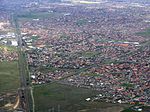Calder Park Raceway
1962 establishments in AustraliaAustralian Grand PrixBuildings and structures in the City of BrimbankDrag racing venues in AustralasiaFormer Supercars Championship circuits ... and 8 more
Motorsport venues in Victoria (state)NASCAR tracksSpeedway venues in AustraliaSport in the City of BrimbankSports venues in MelbourneSports venues in Victoria (state)Use Australian English from September 2015World Touring Car Championship circuits

Calder Park Raceway is a motor racing circuit in Melbourne, Victoria, Australia. The complex includes a dragstrip, a road circuit with several possible configurations, and the "Thunderdome", a high-speed banked oval equipped to race either clockwise (for right-hand-drive cars) or anti-clockwise (for left-hand-drive cars such as NASCAR).
Excerpt from the Wikipedia article Calder Park Raceway (License: CC BY-SA 3.0, Authors, Images).Calder Park Raceway
Calder Freeway, Melbourne Calder Park
Geographical coordinates (GPS) Address Website External links Nearby Places Show on map
Geographical coordinates (GPS)
| Latitude | Longitude |
|---|---|
| N -37.671666666667 ° | E 144.75583333333 ° |
Address
Calder Park Raceway
Calder Freeway 377
3037 Melbourne, Calder Park
Victoria, Australia
Open on Google Maps








